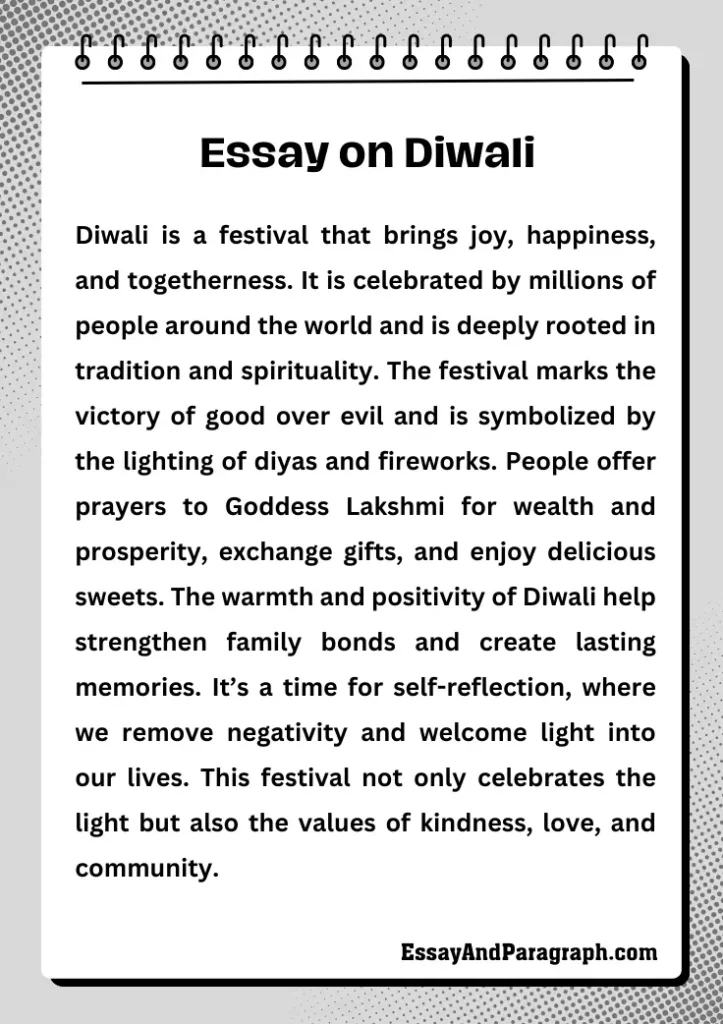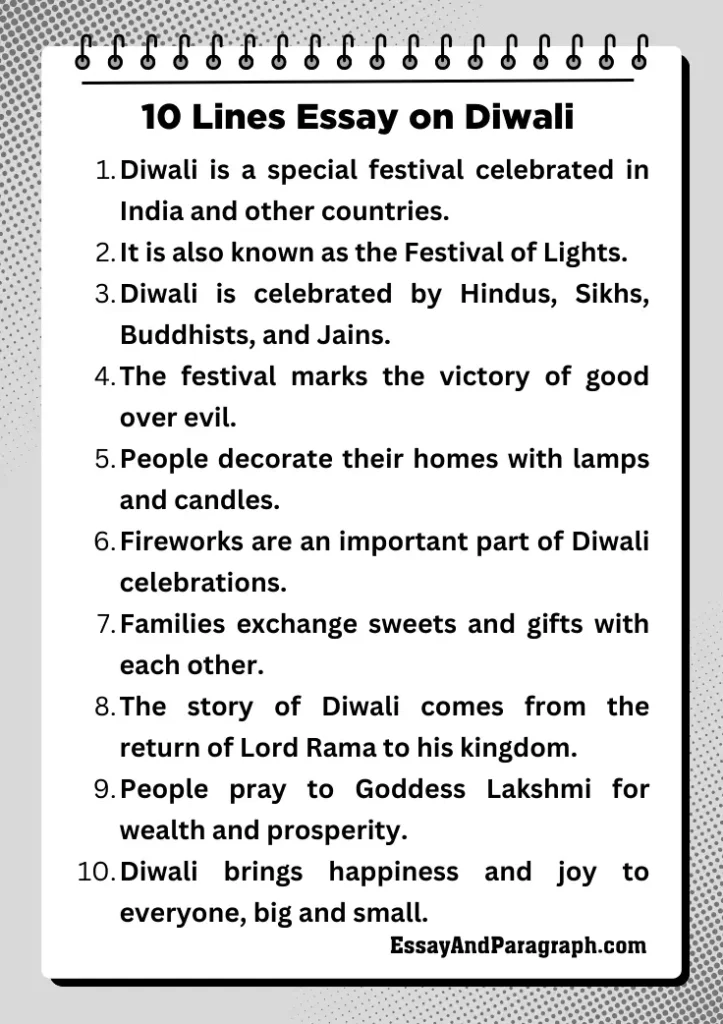Have you ever wondered about the festival that lights up every home with joy and excitement? Diwali, also known as the Festival of Lights, is one of the most celebrated festivals in India and among Indian communities worldwide. It signifies the victory of light over darkness and good over evil. In this article, we will learn how to write an essay on Diwali, making it easy and enjoyable to understand.
10 Lines Essay on Diwali
Diwali is a special festival celebrated in India and other countries.
It is also known as the Festival of Lights.
Diwali is celebrated by Hindus, Sikhs, Buddhists, and Jains.
The festival marks the victory of good over evil.
People decorate their homes with lamps and candles.
Fireworks are an important part of Diwali celebrations.
Families exchange sweets and gifts with each other.
The story of Diwali comes from the return of Lord Rama to his kingdom.
People pray to Goddess Lakshmi for wealth and prosperity.
Diwali brings happiness and joy to everyone, big and small.

10 Lines Essay on Diwali
Short Essay on Diwali
Diwali, also known as the Festival of Lights, is one of the most important and joyous festivals in India. It is celebrated by millions of people, including Hindus, Sikhs, Buddhists, and Jains. The festival signifies the victory of light over darkness and good over evil. It is celebrated in honor of Lord Rama’s return to his kingdom after defeating the demon king Ravana. People light oil lamps called diyas to mark this special occasion.
During Diwali, families come together to clean and decorate their homes. Homes are filled with the glow of diyas, colorful rangolis, and festive lights. The streets are adorned with decorations, and the air is filled with the sound of fireworks. On the night of Diwali, families offer prayers to Goddess Lakshmi, the goddess of wealth and prosperity. The prayers are meant to bring good fortune and success in the coming year.
Exchanging gifts and sweets is a major tradition of Diwali. People visit friends and relatives, sharing sweets like laddus and barfis. These acts of giving symbolize the warmth of relationships and the joy of togetherness. The atmosphere during Diwali is filled with happiness, excitement, and a sense of renewal.
Although Diwali is a festival of celebration, it also carries a deeper spiritual meaning. It encourages people to rid themselves of negativity and embrace positivity. It reminds everyone to focus on virtues such as kindness, generosity, and love. Diwali is not just about lights and fireworks; it is about fostering goodwill, making memories, and spreading joy.
Long Essay on Diwali
Diwali, or the Festival of Lights, is one of the most significant festivals in India, celebrated with great enthusiasm and devotion. Diwali is observed by millions of people, especially Hindus, but also by Sikhs, Buddhists, and Jains, each community observing it for different reasons. It is celebrated over a period of five days, each day having its own significance, and the grand celebrations culminate on the third day, known as Diwali itself.
The legend behind Diwali is rooted in the ancient Hindu epic, the Ramayana. It is believed that Lord Rama, the prince of Ayodhya, returned home after spending 14 years in exile, during which he fought and defeated the demon king Ravana. People lit lamps to guide his way back to his kingdom, marking the triumph of good over evil. This is the central theme of Diwali, where light symbolizes goodness, and darkness represents evil.
The celebrations of Diwali are vibrant and full of life. The preparations begin well in advance. People clean and decorate their homes, as it is believed that Goddess Lakshmi, the goddess of wealth, visits homes that are clean and well-lit. Diyas, or small oil lamps, are placed in every corner of the house, illuminating it with a warm, golden glow. Colorful rangolis, made from colored powders, flowers, and rice, are created at the entrances of homes to welcome guests and the goddess.
One of the highlights of Diwali is the lighting of fireworks. The night sky is filled with dazzling displays of firecrackers, rockets, and sparklers, adding to the festive mood. Fireworks symbolize the joy of the people living on earth, making the gods aware of their happiness. While fireworks are a significant part of Diwali, it is also important to remember the environmental impact of excessive noise and pollution. In recent years, many people have been moving towards eco-friendly celebrations with less harmful fireworks.
On the night of Diwali, families gather to offer prayers. The main prayer is for Goddess Lakshmi, seeking blessings for wealth, prosperity, and happiness. People also pray to Lord Ganesha, the remover of obstacles, to ensure smooth paths ahead. The prayers are followed by the exchange of gifts and sweets. People visit relatives and friends, sharing happiness and strengthening bonds of love and friendship.
Another essential aspect of Diwali is the sense of community. Diwali brings together people from different walks of life. It is a time to forget past grievances and come together in harmony. Communities organize Diwali fairs, cultural programs, and social gatherings, further enhancing the sense of belonging.
The festival of Diwali is also a time of self-reflection. It is an opportunity for individuals to reflect on their own lives and let go of negative thoughts and actions. Diwali encourages people to embrace virtues like kindness, compassion, and honesty. The glow of the diyas is a reminder to keep shining with goodness in a world that often seems dark and chaotic.
In conclusion, Diwali is much more than just a festival. It is a celebration of light, positivity, and togetherness. It carries both spiritual and cultural significance, encouraging individuals to focus on goodness, remove negativity, and spread love. Diwali brings hope for a bright and prosperous future, and it continues to unite people across the world.
FAQs on Diwali
1. What is Diwali?
Diwali is a major Hindu festival celebrated in India and other countries. It marks the victory of good over evil and light over darkness. People celebrate by lighting diyas (oil lamps), decorating their homes, and enjoying fireworks.
2. Why is Diwali celebrated?
Diwali is celebrated to honor Lord Rama’s return to his kingdom after defeating the demon king Ravana. It symbolizes the triumph of good over evil. People also worship Goddess Lakshmi during Diwali for wealth and prosperity.
3. How long does Diwali last?
Diwali is celebrated over five days. The main day of Diwali is the third day, but the festivities begin with Dhanteras, followed by Naraka Chaturdashi, Diwali, Govardhan Puja, and Bhai Dooj.
4. What are some traditional foods during Diwali?
During Diwali, families prepare and share a variety of sweets such as laddus, barfis, and halwa. Savory dishes like samosas and pakoras are also enjoyed. These foods symbolize sharing and the sweetness of life.
5. What is the significance of lighting diyas during Diwali?
Lighting diyas symbolizes the removal of darkness and the arrival of light. It is believed that the goddess Lakshmi, the goddess of wealth, visits homes that are illuminated, bringing prosperity and good fortune.
6. How do people in different cultures celebrate Diwali?
Although Diwali is primarily a Hindu festival, people of various cultures, including Sikhs, Jains, and Buddhists, celebrate it in their own way. Sikhs celebrate the release of Guru Hargobind Ji from imprisonment, while Jains commemorate Lord Mahavira’s enlightenment. Buddhists in some regions celebrate the triumph of light over darkness as well.
Top 5 Quotes on Diwali
“Diwali is a reminder that light overcomes darkness, hope conquers despair, and joy wins over sadness.”
“The light of Diwali brings hope and prosperity to our homes, hearts, and communities.”
“Let the beauty of Diwali fill your heart with love and light.”
“Diwali is not just a festival of lights, but a celebration of the triumph of good over evil.”
“Celebrate Diwali with joy, and let the world glow with your kindness.”
Summary
Diwali is a festival that brings joy, happiness, and togetherness. It is celebrated by millions of people around the world and is deeply rooted in tradition and spirituality. The festival marks the victory of good over evil and is symbolized by the lighting of diyas and fireworks. People offer prayers to Goddess Lakshmi for wealth and prosperity, exchange gifts, and enjoy delicious sweets. The warmth and positivity of Diwali help strengthen family bonds and create lasting memories. It’s a time for self-reflection, where we remove negativity and welcome light into our lives. This festival not only celebrates the light but also the values of kindness, love, and community.





